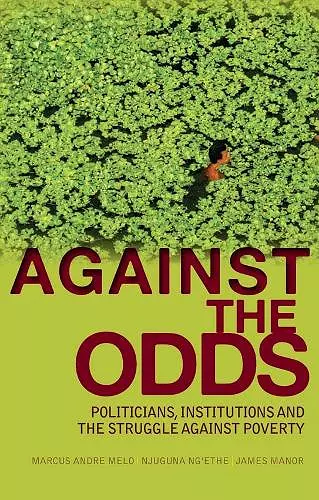Against the Odds
Politicians, Institutions and the Struggle Against Poverty
Njuguna Ng'ethe author James Manor author Marcus André Melo author
Format:Paperback
Publisher:C Hurst & Co Publishers Ltd
Published:1st Jan '12
Currently unavailable, and unfortunately no date known when it will be back

Against the Odds is a Machiavellian study of the machinations of three senior politicians in quite different developing countries who adroitly played the tough political game in ways that reduced poverty. The three - former President Fernando Henrique Cardoso of Brazil, President Yoweri Museveni of Uganda, and Chief Minister Digvijay Singh in the Indian state of Madhya Pradesh - had scarcely heard of one another, and never communicated. And yet they used a broadly similar repertoire of political devices - persuasion, distractions, bargaining, stealth and pressure - to pursue broadly similar goals. They demonstrated two crucial things: poverty reduction is politically feasible, even in the teeth of daunting economic and political constraints; and it is politically beneficial to those who achieve it, since it enhances their popularity, legitimacy and influence. If leaders in other developing countries who are naturally preoccupied with their own political interests recognise these things, then serious efforts to reduce poverty will become more common elsewhere. This book is, unusually, the work of three well-known political scientists from Brazil, Kenya and Britain - each of whom specialises in one of the three countries that are analysed. After extensive field research, they engaged in detailed comparative discussions that impart greater coherence to Against the Odds, especially its conclusions.
The key message of this uplifting and hugely important book is that 'politics matters; politicians matter'. The authors show that political entrepreneurship in the service of the poor is not only possible, but can be made to work, including for the politician. Institutions matter, and so do path dependencies, but not as much as we are often told. That's another message of this book and it's one that is written into the careers of its main protagonists, Yoweri Musaveni, Digvijay Singh and Fernando Henrique Cardoso. -- Stuart Corbridge, Professor of Development Studies, London School of Economics
This is a first-rate exploration of political strategies employed by "reform champions" in the introduction and implementation of policies to combat endemic poverty. It successfully combines analysis of institutions and the agency of reform leaders in finding room to manoeuvre in the promotion of policy change. -- Merilee S. Grindle, Edward S. Mason Professor of International Development, Harvard University
When we look back we need biographies as well as studies of institutions, politics and economies, but the literature on recent and ongoing development politics and economics typically ignores political leaders, unless to twist them into bogeymen of the liberal imagination, or ossify them as impossible heroes. This book does the rare and hugely needed job of highlighting the role and characters of three remarkable leaders in different continents. -- Christopher Cramer, Professor of the Political Economy of Development, SOAS, and author of Civil War Is Not a Stupid Thing: Accounting for Violence in Developing Countries
This book makes a strong argument for the potential power of politicians in developing countries to positively influence the poverty reduction agenda, in contrast to the often used "lack of political will" explanation for failures in the struggle against poverty. ... The analysis makes the important argument that pro-poor policies are not only politically feasible, but can also be advantageous for politicians. The authors' conclusion offers an insightful discussion on the conditions under which politicians might pursue poverty reduction agendas, and provide a useful unpacking of the construct of "political will". -- Dr Bina Fernandez, University of Leeds
ISBN: 9781849041195
Dimensions: unknown
Weight: unknown
288 pages